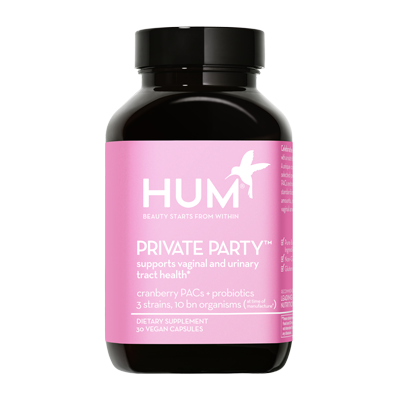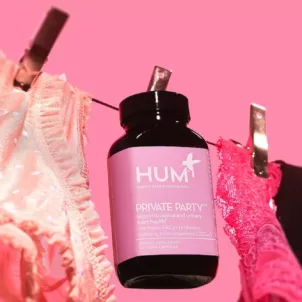Did you know your body houses more than just one microbiome? There are actually four major human microbiome types, and each one is important to your overall health. Here, experts explain what you can do to cultivate healthy microbiomes.
By now, it’s no secret that certain bacteria are on your side, health-wise. In fact, you have ten times as many microorganisms as cells in your body and they make up between 1-3 percent of your body’s mass, according to the National Institutes of Health. And this is a good thing. These are warriors for your body’s immune system, gut health, oral health, skin health, and more and collectively make up the human microbiome. Simply put, a microbiome is a community of bacteria, fungi, and viruses that exist in your body. Of course, the gut microbiome gets a lot of attention, but there are three other microbiomes that are imperative to your body’s overall function, too. Aside from the gut microbiome, the skin microbiome, vaginal microbiome, and oral microbiome all have varied and influential makeups.
Find out how each of your body’s unique microbiomes plays a role in your health, and most importantly, how you can care for your microbiomes and keep the bacteria that populate them as diverse as possible.
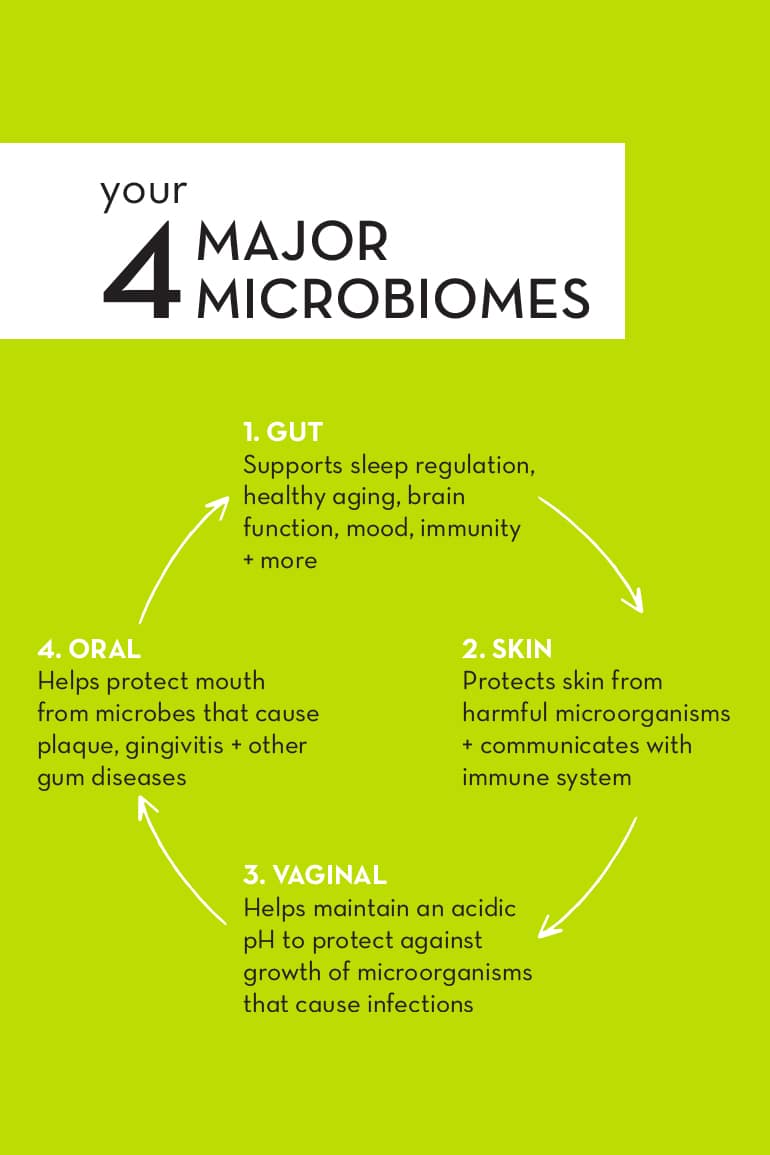
Your Body’s Major Microbiomes
The Gut Microbiome

WHAT IT IS
Your biggest collection of microbes is in the digestive system. In the past few years, scientists have learned even more about the impressive gut microbiome—how it plays a role in sleep regulation, healthy aging, brain function and mood, and even immunity (about 70 percent of your immune system is located in the gut, after all.
Since so much of the immune system activity is centralized in the gut, it’s crucial to have good bacteria present, which help prevent inflammation and abnormal immune responses in the body. The beneficial bacteria in your gut, or probiotics, depend on prebiotics for food, explains Christine Bishara, MD, an internist in the New York City area practicing integrative wellness focused on gut health.
“These are the fibers present in plant-based foods, including fruits, vegetables, and legumes,” she says. So think about it: If you don’t have enough of those prebiotic foods in your diet, that could disrupt probiotics from doing their job of keeping the immune system and digestion regular.
Probiotics also help strengthen the gut lining. “If the integrity of the gut lining is compromised, toxins can leak out into the bloodstream through the weakened gut barriers, leading to a reaction from the immune system which perceives these toxins as dangerous,” adds Dr. Bishara. That immune response may attack the body’s own cells, which could result in chronic inflammation (and some uncomfortable GI symptoms). But there’s plenty you can do to take care of your gut microbiome and prevent inflammation in the first place.
HOW TO CARE FOR IT
- Make sure your diet is packed with prebiotics. Having a diverse gut microbiome is key for gut health. That means eating plenty of plant-based foods to feed the probiotics in your gut. “Aim to eat at least 25 to 30 different plant-based foods per week to help increase gut diversity,” Dr. Bishara says.
- Limit alcohol and processed foods. While you don’t need to cut these things out of your diet completely, consume alcohol and processed foods in moderation. “Both can kill beneficial bacteria in our gut and cause dysbiosis, an imbalance of beneficial and non-beneficial gut microbes,” says Dr. Bishara. Foods that are too processed may also allow bad gut bacteria to grow and contribute further to that imbalance.
- Take a probiotic supplement. It’s a good idea to eat fermented foods, like kefir, kimchi, and miso, which contain the probiotics you need. You can also take a probiotic supplement, particularly one that contains multiple strains of the bacteria bifidobacterium and lactobacillus, like HUM’s Gut Instinct, to boost that diversity in the microbiome. “These probiotic strains have been studied and found to have beneficial effects on not only our gut, but also on our immune system by regulating certain inflammatory pathways,” says Dr. Bishara.
The Skin Microbiome
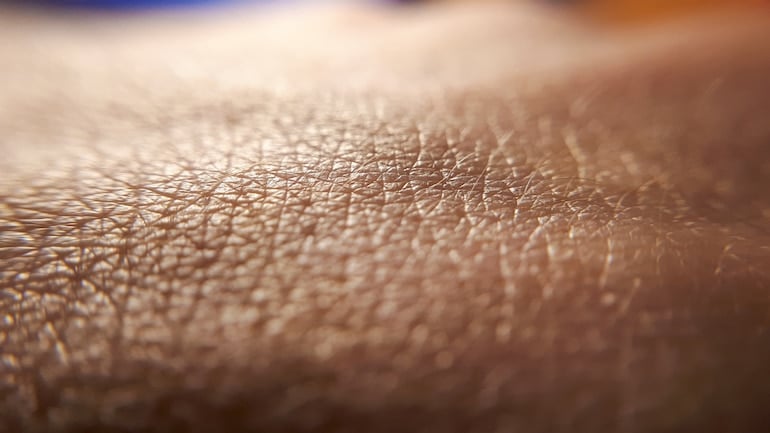
WHAT IT IS
Though you can’t see it, there’s a community of bacteria, fungi, and viruses living on your skin, says Kiran Mian, DO a medical and aesthetic dermatologist based in New York City. But don’t feel like you have to rush for a bar of soap. While it may seem like your skin isn’t “clean” with all of these microorganisms existing on it, they actually live in every layer of healthy skin.
“Think of the microbiome as the skin’s defense line,” Dr. Mian says. It protects the skin from microorganisms that can actually harm you and cause infection, which makes it a major player in the immune system (like the gut microbiome). “The skin microbiome also trains our immune system to learn the difference between harmful and harmless pathogens, and maintains communication with our immune system to tamper inflammation,” adds Dr. Mian.
If something’s not quite right with the skin’s microbiome, it’s common to experience skin allergies, atopic dermatitis, and even skin infections. You need to have a healthy microbiome that can discern between beneficial and potentially detrimental microorganisms, and to keep inflammation that contributes to inflammatory skin conditions, including acne, eczema, and psoriasis, under control. New research connects the gut microbiome and the skin microbiome in what’s called the gut-skin axis. Dysbiosis, especially in the gut, from an imbalanced diet, food allergies, or food intolerances, may cause inflammation that leads to worse acne or other skin conditions.
HOW TO CARE FOR IT
- Exercise as regularly as you can. When you break a sweat, it can act like a prebiotic, feeding the good bacteria in your skin’s microbiome. “Also, the increased blood flow from exercise will benefit your skin overall, delivering fresh oxygen and nutrients,” adds Dr. Mian. And on top of that, an endorphin-boosting dose of exercise reduces the inflammatory stress hormone cortisol, which does not do your skin any favors.
- Don’t go overboard on the hand sanitizer. While hand sanitizer is absolutely crucial for these times when you’re out and don’t have access to soap and water, don’t overdo it if you can help it. Using sanitizer too many times a day or replacing handwashing completely can kill the good bacteria in your skin’s microbiome, Dr. Mian says. She recommends using a moisturizer on your hands after you squirt the sanitizer to protect that skin barrier.
- Try a topical or oral probiotic. Skincare products with fermented probiotic ingredients like kombucha and lactic acid can help calm inflammation and keep skin microflora regular. You can also take an oral probiotic and prebiotic supplement like Skin Squad Pre+Probiotic to promotes the growth of good bacteria, support regular digestion, and support your skin through the gut-skin axis.
The Vaginal Microbiome
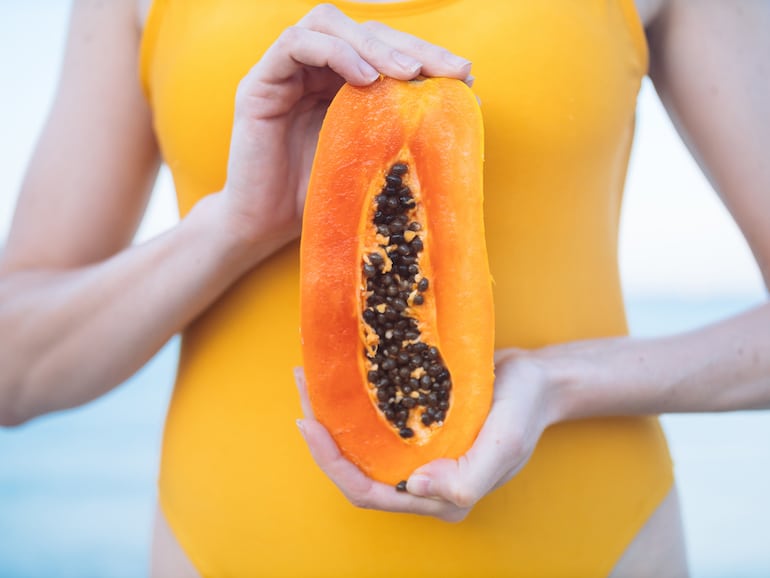
WHAT IT IS
You might be slightly less aware of the vaginal microbiome because it’s not often talked about, but it has an equally important place in keeping your body balanced. The vagina also relies on microorganisms to keep things status quo: specifically, one main kind of bacteria. “The primary colonizing bacteria of a healthy individual are lactobacillus, and the lactic acid they produce is thought to protect against infection,” explains Fahimeh Sasan, MD, the founding OB-GYN of Kindbody in NYC.
The goal of the vaginal microbiome is to keep the pH acidic. An acidic environment can’t support the growth of microorganisms that cause infections, like bacterial vaginosis (BV) and yeast infections, says Dr. Sasan. Some symptoms of disruption to vaginal bacteria include discharge, odor, itching, and irritation. It’s completely normal for the bacteria in the vaginal microbiome to fluctuate, especially during the phases of your menstrual cycle, different types of sexual activity, and with the use of hormonal birth control. The microbiome also shifts dramatically during pregnancy to automatically prepare for vaginal birth, according to the National Institutes of Health’s Human Microbiome Project.
HOW TO CARE FOR IT
- Less is more. There isn’t much you should do in terms of care, because anything that can disrupt your natural pH balance can also disrupt the vaginal microbiome. So stay away from any kind of scented or perfumed vaginal “cleansing” products. “Vaginas are self-cleaning,” says Dr. Sasan. She advises just washing the external area of the vagina with unscented soap and wearing cotton underwear to keep things as clean as possible.
- Don’t ignore symptoms. A regular check-up with your OB-GYN suffices to catch anything abnormal with your microbiome, but if you have symptoms of a potential infection in between, don’t brush them off. Make an appointment with your doctor if you notice any kind of abnormal uterine bleeding, painful sex, irritation, or discharge, Dr. Sasan says.
- Take probiotics. Making oral probiotics a part of your routine can help you maintain healthy vaginal flora, says Dr. Sasan. It can look like eating more foods with probiotics, even yogurt, or taking a probiotic like Private Party, formulated to help balance the vaginal microbiome and promote optimal urinary tract function.
The Oral Microbiome

WHAT IT IS
There’s one last important microbiome, and it’s in your mouth. It lives in the oral mucosa, which includes all the gum tissue, tongue, and inside of the cheeks. Your oral health depends on good bacteria to guard your mouth from microbes that cause plaque, gingivitis, and other gum diseases. Nutrients like zinc, iron, and manganese help bolster that antimicrobial activity, so you need plenty of those nutrients in your diet (think leafy greens, whole grains, and legumes), says De Freitas, MD, the founder and chief biohacker at Onogen. Your Vitamin D levels are important too, not only for the oral microbiome’s health, but to prevent sensitive teeth (your teeth are bones, and bones require Vitamin D), and weakened gums, Dr. Freitas adds.
Your oral microbiome factors into your immunity, too. “It’s a barrier between the outside environment and the host,” Dr. Freitas says. The right bacteria in a healthy oral microbiome help fight off infections from yeast, viruses, and harmful bacteria.
HOW TO CARE FOR IT
- Try natural toothpaste. Particularly if you’re looking to boost the health of your oral microbiome, give fluoride-free toothpaste a try, suggests Dr. Freitas. Since fluoride is antimicrobial, it might also kill the good bacteria in the oral microbiome.
- Load up on Vitamin D. Dr. Freitas recommends taking a Vitamin D supplement consistently for at least 3 months to strengthen your teeth and gums. You can also get some Vitamin D from foods like salmon and other fatty fish, and dairy products fortified with the vitamin.
- Take prebiotics and probiotics. “For teeth and gums, an oral probiotic can help with preventing viruses and pollutants from affecting antimicrobial activity,” says Dr. Freitas. And then prebiotics, which can be found in supplements like Skin Squad, and also in fiber-filled foods, will feed those probiotics to keep all your microbiomes balanced.
